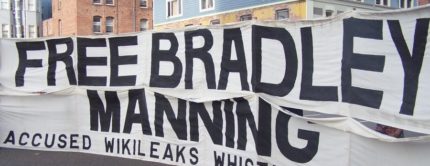As WikiLeaks founder Julian Assange fights the U.K. from a room in the Ecuadorian embassy in London, a major plank in his case why he should not be sent to Sweden to answer questions about rape charges is his fear that Sweden would extradite him to the U.S.—where he says he would face the death penalty for information he released through WikiLeaks.
But the British Foreign Secretary William Hague says such claims are “without foundation” and he has called for more talks between the UK and Ecuador.
Swedish prosecutors have dismissed Assange’s allegations that Sweden is working with the U.S. to get Assange to the United States to stand trial over Wikileaks. Observers say that the international Human Rights Act would prevent the UK or Sweden from sending a person to a country where they could face the death penalty.
And in a written statement to Parliament, Hague said: “As we have discussed with the government of Ecuador, the United Kingdom and Sweden robustly implement and adhere to the highest standards of human rights protection,” Hague said in a written statement to Parliament. “The suggestion that Mr Assange’s human rights would be put at risk by the possibility of onward extradition from Sweden to a third country is also without foundation…In practice, this means that the United Kingdom could only consent to Mr Assange’s onward extradition from Sweden to a third country if satisfied that extradition would be compatible with his human rights, and that there was no prospect of a death sentence being imposed or carried out.”
Assange has been staying in Ecuador’s embassy since June, eating takeout food and peering out at the squadron of British law enforcement stationed outside the embassy to make sure he doesn’t try to make a dash for the airport.
As for the U.S. position, White House spokesman Josh Earnest has said, “The United States views this as a matter to be resolved between the British government, the Ecuadorean government and the Swedish government. At this point, we have not intervened in this matter and I don’t have any guidance for you right now on whether or not that’s something we would intervene in.”
The UK Supreme Court dismissed Assange’s bid to reopen his appeal against extradition and gave him a two-week grace period. But Assange slipped into the west London Embassy before the case went to the courts.
The foreign secretary said there had been seven formal discussions as well as many other conversations and written exchanges with Ecuador in an attempt to reach an acceptable resolution. Last week Hague met with Ecuador’s Vice-President, Lenin Moreno, when he was in London for the Paralympics.
“We wish to continue our dialogue with the government of Ecuador,” Hague said. “We believe that our two countries should be able to find a diplomatic solution. We have invited the government of Ecuador to resume, as early as possible, the discussions we have held on this matter to date.”
A spokesman for the Ecuadorian government in London said Hague’s statement didn’t answer all of Ecuador’s concerns.
“While we accept that there are provisions in the European Human Rights Convention that stops the extradition of a suspect if they face the death penalty, what the UK government have failed to address over the last three months, including today, is the inhumane treatment that Mr. Assange would face were he to be extradited to the USA, including solitary confinement for 23 hours a day, limited access to legal representatives and punitive sentencing should he be found guilty in a military of special court,” he said.
“If the UK provided these basic human rights guarantees then we believe that there would be a quick, fair and honourable solution to the present impasse.”
The fascinating standoff between Ecuador and Britain has pitted a former colonizing superpower against a small South American nation that refuses to give in to threats and intimidation. In a letter sent to Ecuador, the Brits tried to cite a little known law that alleges Britain has the authority to suspend the embassy’s diplomatic protection and allow authorities to go in and get Assange.


